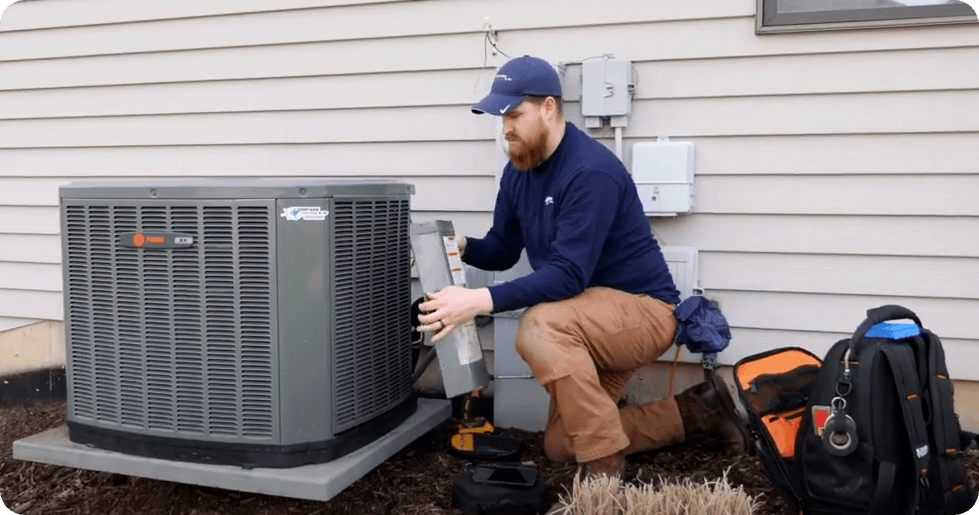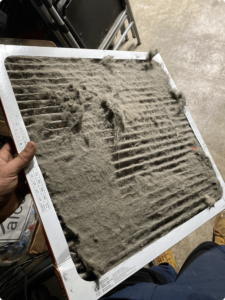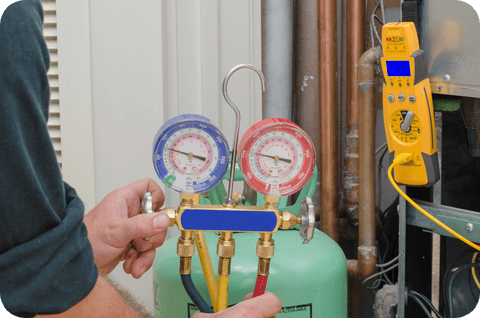Help You?
CLICK TO LEARN MORE ABOUT IRA REBATES AND TAX CREDITS
Homeowner’s Guide To Troubleshooting An Air Conditioner
 As homeowners we are all interested in saving money. And when it comes to caring for our home’s AC systems, having a guide to help us troubleshoot potential problems with our air conditioner, can save us time, uncomfortable days and money.
As homeowners we are all interested in saving money. And when it comes to caring for our home’s AC systems, having a guide to help us troubleshoot potential problems with our air conditioner, can save us time, uncomfortable days and money.
Here at Compass Heating and Air we have been serving the East Dundee, IL area since 2012. We understand your needs and neighborhoods. We have made it our business to provide our customers with responsive, reliable service. And we understand that customer satisfaction comes from knowing that you can rely on your provider every step of the way. So we have put together this short guide to help you understand when it is time to call in the experts.
Central Air Troubleshooting: Common AC Problems
Like most mechanical systems, your AC unit has a language all of its own. Understanding when your air conditioning system is telling you there is a problem early, can help you head off bigger and more expensive fixes later.
In the examples below, a quick diagnostic check by the homeowner can frequently solve the problem without needing to call in an expert. With these basic checks, many that you can do yourself, you can help diagnose the problem and sometimes provide the solution saving time and money.
Weak Airflow
Central AC problems often involve weak airflow. This can be caused by dirty air filters, blocked air vents, or duct leakage. Checking and replacing air filters, ensuring all air vents are open and unblocked, and inspecting ducts for leaks can help restore proper airflow in your air conditioning system. Blower motor problems may also contribute to weak airflow and should be checked by a professional if the issue persists.
AC Blows Hot Air
Common AC problems include the air conditioner blowing hot or warm air. This may be due to a dirty or clogged air filter, low refrigerant level, or a frozen evaporator coil. Regularly replacing air filters, checking refrigerant lines, and inspecting the evaporator coil can help maintain cooling efficiency and prevent these issues.
Strange Sound or Smells
Strange noises and smells are other common air conditioning problems that can affect both central and window air conditioner units. Unusual sounds may indicate a mechanical issue within the system, while unpleasant smells can be caused by mold or mildew buildup in the air vents or ducts. Regular HVAC preventive maintenance can help identify and address these issues before they escalate.
Rising Electric Bills
A significant increase in energy bills may indicate AC issues affecting your air conditioner efficiency. Common AC problems that can lead to higher energy consumption include dirty air filters, blocked air vents, and low refrigerant levels. In addition, a lack of proper maintenance can cause the air conditioning system to work harder, leading to reduced cooling efficiency and increased energy usage.
By addressing these central AC problems through regular maintenance and promptly resolving any issues, homeowners can ensure the efficient operation of their air conditioning systems and keep their homes comfortable during the hot summer months.
Central Air Conditioner Troubleshooting For Homeowners
 Because central air conditioning systems are more complex than window units, there are a few more parts that need to be monitored.
Because central air conditioning systems are more complex than window units, there are a few more parts that need to be monitored.
Air Filter
One of the most common air conditioner problems is a dirty air filter. Dirty air filters can cause low airflow, inadequate cooling, and higher-than-normal energy bills.
What to Do
Check your air filter and replace it if it’s dirty or clogged. Regularly changing your filter can prevent many DIY AC troubleshooting tips and improve your residential air conditioning maintenance.
Thermostat
Incorrect thermostat settings can cause warm air to blow from the vents or prevent the AC from turning on.
What to Do
Ensure your thermostat is set to COOL and not HEAT. If you have a programmable thermostat, check the programming to ensure it’s set correctly for the season.
Circuit Breaker
A tripped circuit breaker can cause the AC not to turn on, indicating potential electrical problems.
What to Do
Locate your home’s main electrical panel and find the air conditioner circuit breakers. Reset the circuit breaker if it’s tripped. If it trips again immediately, contact a professional to inspect the issue.
Outdoor Unit
A dirty or obstructed outdoor unit (compressor and condenser) can cause inefficient cooling, increased energy bills, and frequent repairs.
Read More: AC Inspection List For Homeowners
What to Do
Inspect the outdoor unit for dirt, debris, and foliage. Clean the condenser coil gently with a hose, and ensure there are no objects within 2 to 3 feet of the unit. Keep the unit away from direct sunlight to improve efficiency.
Vents
Blocked or closed air vents can cause the AC to struggle in cooling your home, leading to ice on refrigerant lines, water leaks, or even a damaged compressor.
What to Do
Check all the AC return vents and AC supply vents throughout your home to ensure they are open and unblocked. Remove any obstructions like furniture, rugs, or drapes. Ensure all ducts are properly sealed, and weather stripping is in good condition.
By following these air conditioning troubleshooting steps, homeowners can address the most common air conditioner problems and improve their system’s efficiency. Regular maintenance and understanding how to troubleshoot AC unit issues can save time, money, and frustration.
Air Conditioner Troubleshooting: When You Need A Pro
There are times when even the handiest homeowner will need to call in a pro. For example, refrigerants require a licensed, qualified technician to handle. Plus there are electrical and plumbing components to deal with in air conditioning systems that can be more than the average homeowner can handle.
Knowing whom to call that can provide licensed, qualified technicians in all aspects of your system is important. At Compass Heating and Air, we take pride in our team’s expertise and their ability to troubleshoot the most complex problems.
Read More: What To Check If Your AC Compressor Won’t Turn On
AC Repair Expert for Complex Issues
While there are some central air troubleshooting steps you can take on your own, there are instances when you need to call an ac repair expert. An experienced HVAC technician can handle more complex problems with your air conditioning unit that require specialized skills and tools.
Refrigerant Leak and Water Leaks
 Refrigerant leaks and water leaks in your air conditioner can lead to reduced efficiency and potential damage to your system. Detecting and fixing these leaks requires the expertise of an HVAC technician.
Refrigerant leaks and water leaks in your air conditioner can lead to reduced efficiency and potential damage to your system. Detecting and fixing these leaks requires the expertise of an HVAC technician.
Fan Motors and Drainage Issues
Faulty fan motors or drainage issues in your central AC system can lead to reduced performance or even a complete breakdown. An HVAC technician can diagnose these problems and provide appropriate solutions.
AC Won’t Turn On
When your air conditioning systems won’t turn on, it can be due to various issues, such as tripped breakers or faulty components. In such cases, it’s best to consult an HVAC technician to determine the cause and carry out necessary repairs.
Ductile Cleaning Services and Maintenance
Regular maintenance, including ductile cleaning services, is essential to keep your air conditioner running efficiently. An HVAC repair technician can perform these tasks and ensure the longevity of your system. East Dundee, IL air conditioning system repairs.
Call Compass Heating and Air at (630) 504-8688, for trusted East Dundee, IL air conditioning system repairs.

